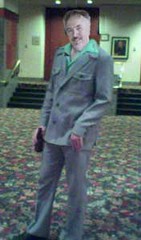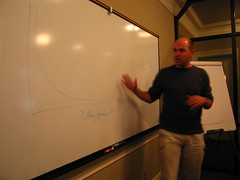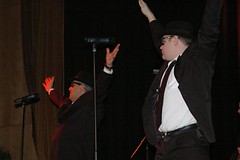Tomorrow I head down to Myrtle Beach, South Carolina, for their 2006 EdTech Conference. I’ve been looking forward to this conference for many reasons. The fact that this is the first conference in what, to me, is the fall educational technology conference season. I love ed tech conferences. I’ve said that before.
Another reason why I’ve been looking forward to this conference is that my classroom teaching happened in South Carolina. It started in 1976, when I was finishing up my last semester at Western Carolina University. There was a teacher glut on, and we knew that there wouldn’t be enough jobs for all of us. I got a call from Frank Patterson, the new principal for Pageland Junior High, in Pageland, South Carolina. I knew the town, because my boy scout troop always stopped there for watermelon on our way to Myrtle Beach each summer.
Patterson asked me to come down for an interview, which surprised me. To say that my college performance was lack-luster would be generous. I had been named student-teacher of the year by the WCU chapter of the Student North Carolina Association of Educators, but that’s because there were only two men in the chapter, and the other one declined when he learned he’d have to get on a stage. Anyway, that’s probably why they called.
 I drove down to Pageland, in my father’s leasure suit (see right), and went in for the interview. I don’t remember much about our conversation, except that they offered me the job, and I accepted. I signed the contract and they signed the contract. Then, I realized that I had been interviewing for a Math position and they realized that they had been interviewing a Social Studies teacher. I said that I’d still like the job, and they said they still wanted to hire me, so we went with it.
I drove down to Pageland, in my father’s leasure suit (see right), and went in for the interview. I don’t remember much about our conversation, except that they offered me the job, and I accepted. I signed the contract and they signed the contract. Then, I realized that I had been interviewing for a Math position and they realized that they had been interviewing a Social Studies teacher. I said that I’d still like the job, and they said they still wanted to hire me, so we went with it.
I went back to WCU for the summer semester, where I took some Math methods classes, and met Brenda. We spent all summer taking classes and tubing down the Tuckaseegee River.
My first year of teaching was a disaster. By Christmas, I had signed up for the Civil Service Exam, planning to leave teaching at the end of the year and start a challenging career as a rural postal carrier. I also moved out in the country during the winter vacation weeks, and that sense of separation from the job gave me a better perspective on life.  At the end of the school year, the social studies teacher announced that she was getting married and would be moving back to Boone, North Carolina. I taught Social Studies the rest of my years as a teacher, and loved every minute of it — and I eventually became a pretty good teacher. I also met my first personal computer a few years later, a Radio Shack Model I computer (see left) — and I was seduced.
At the end of the school year, the social studies teacher announced that she was getting married and would be moving back to Boone, North Carolina. I taught Social Studies the rest of my years as a teacher, and loved every minute of it — and I eventually became a pretty good teacher. I also met my first personal computer a few years later, a Radio Shack Model I computer (see left) — and I was seduced.
That’s when it really got interesting!
technorati tags:scedtech06, scedtech, warlick, conferences, teaching, leisuresuit
Blogged with Flock


 I took a fairly extensive tour of the
I took a fairly extensive tour of the 
 At the end of the school year, the social studies teacher announced that she was getting married and would be moving back to Boone, North Carolina. I taught Social Studies the rest of my years as a teacher, and loved every minute of it — and I eventually became a pretty good teacher. I also met my first personal computer a few years later, a Radio Shack Model I computer (see left) — and I was seduced.
At the end of the school year, the social studies teacher announced that she was getting married and would be moving back to Boone, North Carolina. I taught Social Studies the rest of my years as a teacher, and loved every minute of it — and I eventually became a pretty good teacher. I also met my first personal computer a few years later, a Radio Shack Model I computer (see left) — and I was seduced.
 The Australian Computers in Education Conference began many hours ago. Check out the conference at:
The Australian Computers in Education Conference began many hours ago. Check out the conference at: